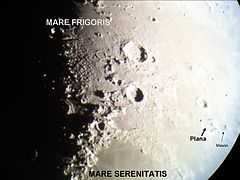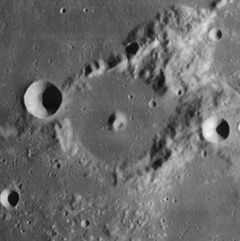Plana (crater)
|
Lunar Orbiter 4 image | |
| Coordinates | 42°12′N 28°12′E / 42.2°N 28.2°ECoordinates: 42°12′N 28°12′E / 42.2°N 28.2°E |
|---|---|
| Diameter | 44 km |
| Depth | 1.0 km |
| Colongitude | 332° at sunrise |
| Eponym | Giovanni A. A. Plana |

Plana is a lunar crater that lies on the boundary between two small lunar mare areas, with Lacus Mortis to the north and the larger Lacus Somniorum on the southern side. It is joined to the crater Mason to the east by a short stretch of rugged ground. Due north of Plana in the midst of the Lacus Mortis is the prominent crater Bürg.
This is a crater with a slender outer rim that has been worn and eroded by impacts. This rim surrounds an interior that has been flooded by basaltic lava, leaving a level surface with only a central peak at the midpoint projecting up through the floor. There is a small craterlet near the eastern rim, but otherwise the interior floor is nearly featureless. The outer rim has some narrow breaks along the northwest, and the side is lower along the southwestern face. A small, circular crater intrudes slightly into the northwestern part of the rim.
Satellite craters
By convention these features are identified on lunar maps by placing the letter on the side of the crater midpoint that is closest to Plana.
| Plana | Latitude | Longitude | Diameter |
|---|---|---|---|
| C | 42.7° N | 27.1° E | 14 km |
| D | 41.7° N | 26.2° E | 7 km |
| E | 40.5° N | 23.6° E | 6 km |
| F | 39.8° N | 24.0° E | 5 km |
| G | 39.1° N | 22.9° E | 9 km |
The name Mandela (or Nelson Mandela International Peace Crater) has been proposed for Plana G, in honor of Nelson Mandela, by the Luna Society International,[1] but this has not been approved by the IAU.
References
- ↑ Luna Society International Designates "Peace Crater" to Honor Nelson Mandela, retrieved 10-9-2013
- Andersson, L. E.; Whitaker, E. A. (1982). NASA Catalogue of Lunar Nomenclature. NASA RP-1097.
- Blue, Jennifer (July 25, 2007). "Gazetteer of Planetary Nomenclature". USGS. Retrieved 2007-08-05.
- Bussey, B.; Spudis, P. (2004). The Clementine Atlas of the Moon. New York: Cambridge University Press. ISBN 978-0-521-81528-4.
- Cocks, Elijah E.; Cocks, Josiah C. (1995). Who's Who on the Moon: A Biographical Dictionary of Lunar Nomenclature. Tudor Publishers. ISBN 978-0-936389-27-1.
- McDowell, Jonathan (July 15, 2007). "Lunar Nomenclature". Jonathan's Space Report. Retrieved 2007-10-24.
- Menzel, D. H.; Minnaert, M.; Levin, B.; Dollfus, A.; Bell, B. (1971). "Report on Lunar Nomenclature by the Working Group of Commission 17 of the IAU". Space Science Reviews 12 (2): 136–186. Bibcode:1971SSRv...12..136M. doi:10.1007/BF00171763.
- Moore, Patrick (2001). On the Moon. Sterling Publishing Co. ISBN 978-0-304-35469-6.
- Price, Fred W. (1988). The Moon Observer's Handbook. Cambridge University Press. ISBN 978-0-521-33500-3.
- Rükl, Antonín (1990). Atlas of the Moon. Kalmbach Books. ISBN 978-0-913135-17-4.
- Webb, Rev. T. W. (1962). Celestial Objects for Common Telescopes (6th revision ed.). Dover. ISBN 978-0-486-20917-3.
- Whitaker, Ewen A. (1999). Mapping and Naming the Moon. Cambridge University Press. ISBN 978-0-521-62248-6.
- Wlasuk, Peter T. (2000). Observing the Moon. Springer. ISBN 978-1-85233-193-1.
